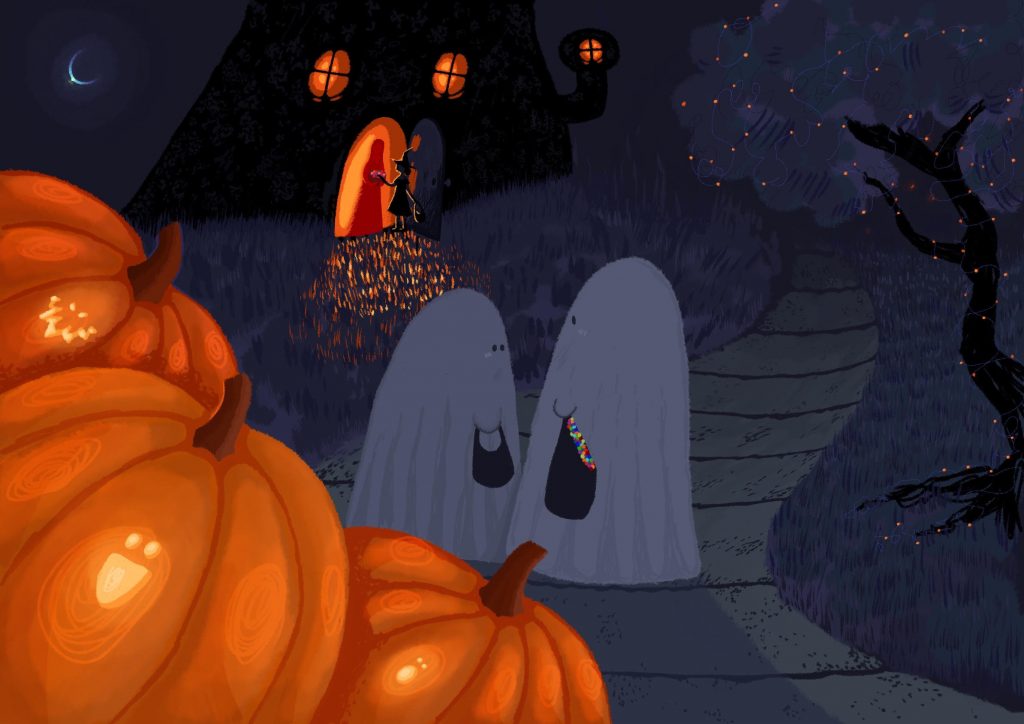By Liza Williams

Graphic by Natalie Hsiao
Every October, as Halloween approaches, one familiar debate returns: when is someone “too old” to go trick-or-treating? While the question seems innocent enough, it’s surprisingly controversial among teens and adults alike. The normally harmless trend of visiting people’s houses in costumes has been viewed by many as being only for kids. However, in some places throughout the United States, this debate has turned into actual legislation.
Across the country, multiple local governments have written age limits for trick-or-treating in their civil laws. For example, starting in 1970, Chesapeake, Virginia, has mandated that anyone over the age of fourteen is barred from trick-or-treating. If this is violated, someone could be facing a Class 4 misdemeanor charge and a $250 fine. Despite having this law in place, there have been no reported arrests or fines for trick-or-treating over the age limit. But Chesapeake isn’t the only area to make trick-or-treating a legal matter. Other counties in Virginia, like Williamsburg and Suffolk, prohibit trick-or-treating after the age of twelve. Belleville, Illinois, has also banned children over twelve from wearing a mask and ordered those in high school to remain off the streets to trick-or-treat. Many other counties in states like Maryland, Louisiana, and South Carolina have placed similar age restrictions.
But why exactly has trick-or-treating become such a serious matter? Supporters of these restrictions argue that Halloween is meant to preserve a sense of childhood wonder. The presence of teenagers in the space not only intimidates little kids but also threatens to ruin that sense of joy and excitement. There’s also the idea of trick-or-treating not being seen as “cool” due to its childish nature. This mindset has affected why many teens choose to stop trick-or-treating at a certain age. According to a Senior at RHS, “I went trick or treating up until sophomore year; I always loved doing it, but after that I felt insecure. It became embarrassing to be out going door to door — even if I was out super late — because apparently you have to party on Halloween.”
Besides the subjectivity and common perspective among teens, there’s also a reason behind not wanting older kids trick-or-treating. For one, there’s fear of teens disrupting neighborhoods or antagonizing people who are just trying to enjoy a night of fun and candy. According to a CNN piece on these laws, Chesapeake officials have clarified that no one is being arrested for asking for candy; it’s rather in place to prevent any malicious acts like smashing pumpkins or antagonizing younger trick-or-treaters.
There’s a good amount of critics who contest these laws as unnecessary and joyless. For many teens, trick-or-treating is one of the last ways to have a sense of childhood fun without pressure. For those who do partake, it’s a great way to spend time with friends and have a couple of hours to enjoy themselves. There are some teens who take their younger siblings trick-or-treating, and there are others who enjoy putting together elaborate costumes to show off to their neighborhood. People believe that shaming them for that, legally or socially, feels mean and counterproductive.
In truth, many of these laws represent symbolism more than functionality. They are only meant to draw a line between children and adults, however arbitrary it may seem. And this is what makes answering the question of what age is “too old” to trick-or-treat tricky, as there is no clear moment when someone outgrows Halloween. Rather than focusing on age, maybe a better measure is attitude. A teenager who follows curfew and is respectful towards fellow trick-or-treaters and those handing out candy isn’t doing anything wrong and should not be punished for doing so. No matter how people view the concept, it shouldn’t affect someone’s decision if they really want to take part in the tradition. On the other hand, older teens who want to disrupt people on Halloween should reconsider participating in trick-or-treating, or at least face consequences under more specific laws. There are also many other ways people can spend Halloween besides trick-or-treating, like going to parties, watching scary movies, or just hanging out with friends. In the end, Halloween is a holiday that should be meant for everyone. And as for when someone is “too old” to trick-or-treat? It really shouldn’t matter. As long as you’re wearing a costume and being respectful of both kids and other teens or adults, you have the same right as any kid to go trick-or-treating.
Works Cited
Alaa Elassar. “You May Have Heard about the Virginia Town That Went Viral for Banning Anyone over 14 from Trick or Treating. Here’s the Whole Story.” CNN, 23 Oct. 2019, www.cnn.com/2019/10/23/us/chesapeake-halloween-punishment-trnd. Accessed 27 Oct. 2025.
“How Old Is Too Old to Trick-Or-Treat? Boo! Some Towns Have Legal Age Limits at Halloween.” USA TODAY, www.usatoday.com/story/news/nation/2023/10/31/trick-or-treating-age-limit-halloween/71400040007/.
Solé, Elise. “How Old Is Too Old to Trick or Treat?” TODAY.com, TODAY, 12 Sept. 2025, www.today.com/parents/family/how-old-too-old-trick-or-treat-rcna230783.
